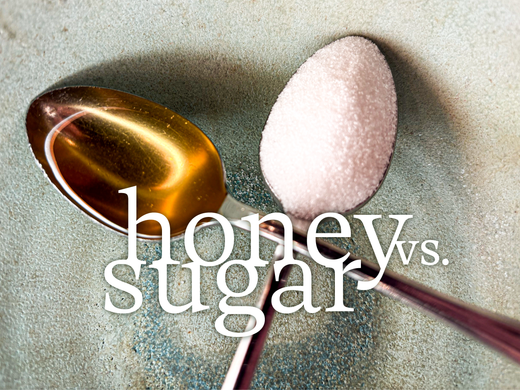Ok, before we get started let's be clear, raw honey is sugar, the same way that mountain spring water and tap water are both, you guessed it… water. So is there really a measurable difference? Well, I dare you to go find a decent artesian well in your neck of the woods and pick that fight. (Let me know how it goes.)
While everyone agrees on the benefits of drinking good clean water, (regardless of where you prefer to source it) most health conscious folks have learned to limit their added sugar intake, but some folks have taken it a step further by completely villainizing sugar. But here’s the deal, sugar by itself isn’t dangerous, it occurs naturally in more than half of the foods we eat, even in the unprocessed organic good stuff. And when it’s not readily available in our diet, we're cleverly engineered to metabolize things like potatoes into sugar, because well, we have to have it. Our bodies use dietary sugars before any other source, providing energy to the brain and nervous system, then continuing to all the other organs including the heart, lungs, kidneys, liver, GI tract and even your skin.
Simply put, we need sugar, we just don’t need too much of it. Yes, we should all be more responsible about how much we eat, how often, and where we get it from. But, in the event that we, as mature adults, want to head out on the town and “sweeten responsibly” (gasp) is Honey a better option?
Let's take a look.
To start with, raw honey has at least 181 different components. You read that right, at least 181. By comparison, table sugar is made up of just two components, glucose and fructose, and they are actually molecularly bonded to form a single compound called sucrose. You know that $3 bottle of natural spring water they’re peddling at the grocery store? It contains maybe a dozen trace minerals - maybe even less. That doesn’t hold a candle to the nutritional complexity of raw honey.
To start with, honey has 7 different sugars, including Fructose, Glucose, Sucrose, Dextrose, Maltose, Galactose, and even trace elements of Lactose, all of which the body metabolizes differently which is why honey has a lower glycemic index than table sugar. It has 26 different amino acids which help to build muscle, boost your immune system, and even digest food. It contains trace minerals like calcium, iron, zinc, potassium, phosphorus, magnesium, selenium, chromium, and manganese, not to mention a number of vitamins like B6, and vitamin C. It also contains beneficial enzymes, probiotics, and antioxidants that have been proven to provide numerous benefits to the human body.
Yes, all of these are trace benefits, and yes, 80% of honey is still some form of sugar, but guess what, if you’re choosing to add a little sweetness to an otherwise healthy diet, the difference between raw honey and table sugar is at least 90 times bigger than the difference between an artesian well and your kitchen faucet.
Just like the companies selling bottled water, there are plenty of honey companies who are not being honest about what’s in the jar. Most companies heat their honey north of 140 degrees during bottling and still slap a sticker on it that proudly (though erroneously) says “RAW” on it. That honey has lost up to 70% of the beneficial enzymes, polyphenols (antioxidants), and probiotics found in unheated honey.
Whether you buy it from us, or some other crazy beekeeper that's more interested in being honest than rich, take the time to shop carefully, sweeten responsibly, and enjoy the benefits of truly raw honey.

